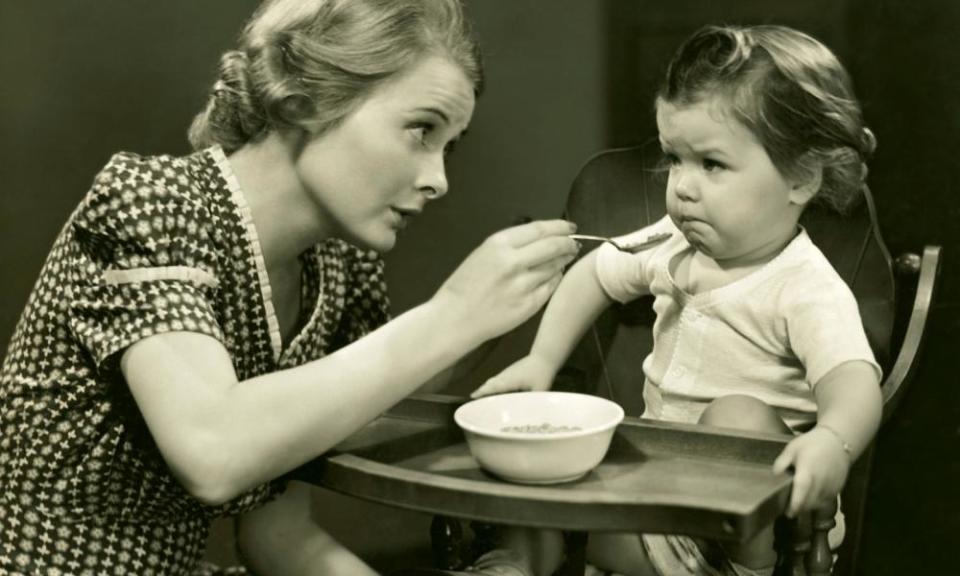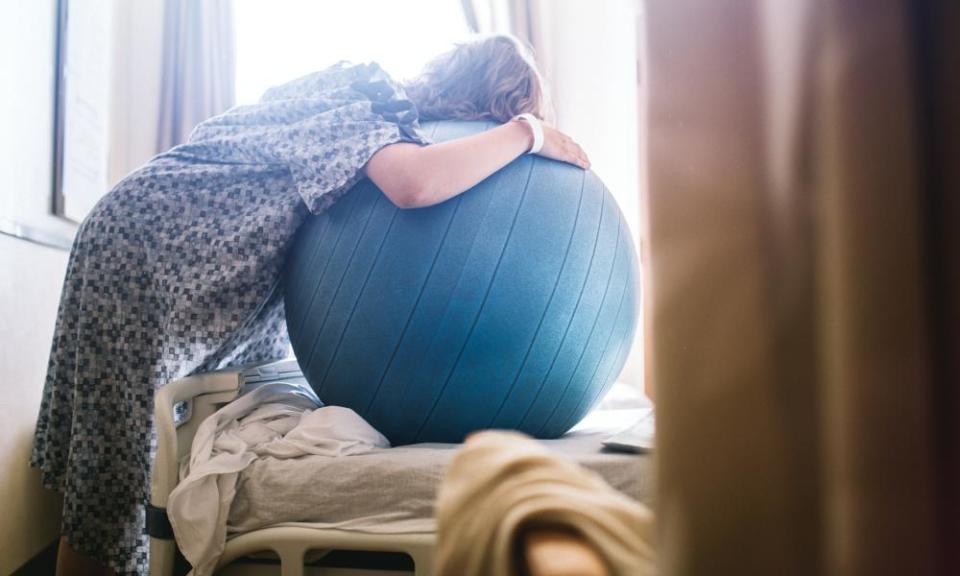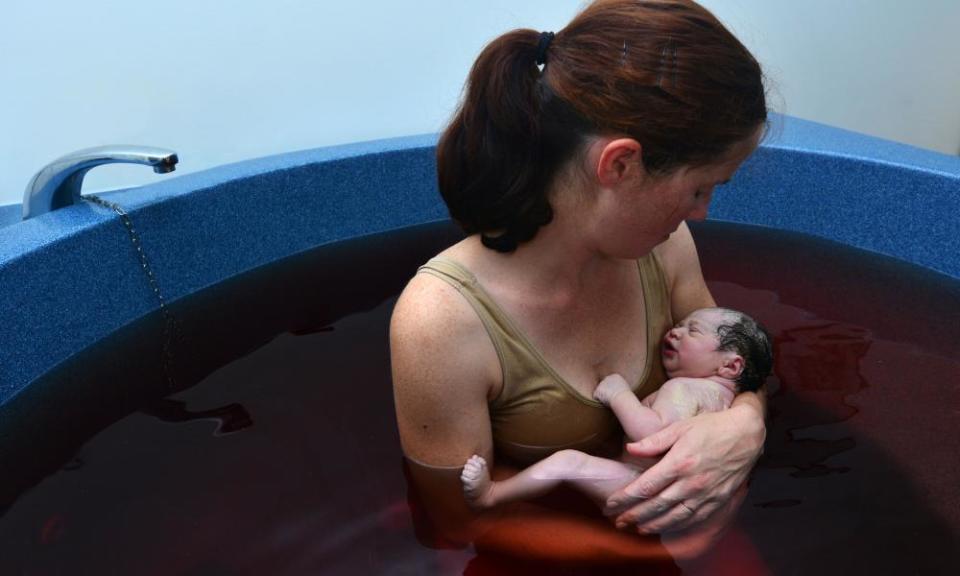Parent trap: why the cult of the perfect mother has to end
It’s the middle of a dark, November night, and I’m about to have my first baby. But instead of the joyful experience I’d hoped for, I am being rushed into the operating theatre to have an emergency caesarean under general anaesthetic. I have a dangerous complication and my son’s life is at risk. Four hours earlier, I’d been sent home by a midwife who told me I couldn’t stay in hospital and have an epidural because labour wasn’t properly “established”.
It’s a week later and I’m back home with my son who, thankfully, made it. But I’m struggling. If someone asks me how I am, in a kindly voice, my voice cracks. I’m spending a lot of time sitting on the bed in a milk-stained dressing gown. In a few days, my partner will go back to work.
It’s five years later. I’m tired and hungry and alone with the children, who are bickering in the bath. It has been a long evening of trying to keep my temper. My son whacks his little sister. I shout so loud my throat hurts, pull him out of the bath, and shut him in his room. I’d slipped him a towel, but I’m still overcome with remorse. After they go to bed, I sink wretchedly into parenting websites, searching for reassurance. But all I find is cheery, zero-tolerance tips on positive reinforcement and leading by example.

Too often the inevitable downsides of motherhood are hushed up lest young women are “put off”. Yet the scraps of honesty that escape the school-gates stiff upper lip have always brought me huge relief. Realism is a political act: it builds solidarity and better conditions. And this desire to join the dots spurred me to write a manifesto to improve child-rearing for all. Because as a mother, I have felt desperately lonely, existentially bored and excruciatingly humiliated by glaring strangers on the bus. I have clung on, panicked, to my professional and social identity while tumbling through babyworld and hurtling between the incommensurate time zones of school and work. I have felt as if I am failing every single day since my son was born 11 years ago.
All this, despite the fact that I am well resourced and well supported. I didn’t have fertility treatments, or miscarriages, or postnatal depression, or difficulties breastfeeding. And this was all before the pandemic.
I am also, I hasten to add, a very happy mother. My children have lit up my life. I miss them pathetically when they go for a sleepover. But the good bits, though plentiful, don’t need affirming. The idealisation of motherhood is everywhere in our culture – from the gaga coverage of baby royals to the subtly reactionary ideology of contemporary TV: even the lesbian workaholic protagonist of the French comedy Call My Agent renounces her high-powered career to become a stay-at-home mum in the end.
Motherhood is one of our modern, enlightened society’s awkward little secrets. Here we are with more than 100 years of feminism under our belts, including 50 years of second-wave feminism, during which many consciousness-raising hours were spent unpicking domestic enslavement. Yet mothers are still underpaid, overworked, exploited, overlooked, frazzled, isolated and perpetually guilty.
If anything, feminism’s longevity compounds the problem: the dial hasn’t shifted, but we want to move on. Calls for affordable childcare or flexible working are met with stifled yawns. The political energy has been sapped before meaningful change has occurred. I read articles about the rise of the hands-on dad. Yet when I go to a PTA coffee morning or a school curriculum meeting, mums outnumber dads by 20 to one.
In the UK, half of all mothers develop a mental health problem before or after birth, according to the National Childbirth Trust (NCT). And 10% to 15% experience postnatal depression; many researchers believe the prevalence is even higher. Around 30% of domestic abuse begins in pregnancy. Suicide is the leading cause of death for mothers during their baby’s first year. Research commissioned by the Red Cross and the Co-op in 2016 found that nearly half of mothers under 30 feel lonely often or all the time; 82% feel lonely some of the time. Fewer than 7% of couples, according to a 2019 study from University College London, split the domestic load – let alone the mental load – equally. Most mothers work part time, where pay is lower and prospects for promotion are reduced by more than half. By the time a woman’s first child is 12, she is paid, on average, 33% less than a man, according to the Institute for Fiscal Studies. Becoming a father gives men’s earnings a boost.
At a time when women are supposed to be more liberated than ever before, modern motherhood has become rigidly perfectionist
Some things have got worse. This statistical reality is concealed by the rhetoric of feminist progress, choice and empowerment. At a time when women are supposed to be more liberated than ever before, modern motherhood has become rigidly perfectionist. Support networks of extended families and tight-knit communities have fallen away, but expectations have been ramped up.
If mothers really did what NCT classes, the advice industry and the media recommend, they would have children in their 20s, not drink while trying to conceive, avoid alcohol, caffeine and a host of delicious foods when pregnant, and steer clear of DIY materials and cleaning products. They would choose a “natural” midwife-led birthing centre and eschew anaesthesia. They would breastfeed exclusively and on demand for at least six months. They would not sleep-train their baby. They would not work – or only very part time – during the first three years.
And they would pay full attention at all times while looking after their children, playing with them assiduously and enthusiastically. They would never lose their temper nor put them on a time out. And they would praise them for good behaviour, loudly and continuously.
This is not a realistic way to live.

Any complaints from mothers about such standards are liable to be read as criticism of their children, evidence of bad motherhood, or signs of unthinking privilege – hence the ubiquitous retort: “So you think you’re the first person to have a baby?” Motherhood has become a curiously politics-free zone: there’s no sign of a mothers’ #MeToo.
In a social media-scrutinised, global-competitive world, every aspect of children’s lives must be optimised. Domestic life has become Instagram-filtered, privatised, and atomised. The sunny agora of the mum messageboard thread offers solidarity, but also passive-aggressive disapproval. Mothers today can find themselves cooking three separate dinners, while their own mothers would probably have briskly ignored the complaints of fussy eaters.
Then there is the myth that our historic counterparts were selflessly devoted to their offspring – and that things only changed when women entered employment or further education. Think of the tut-tutting about the shift from home cooking to ready meals.
Of course, historical records reveal this morality tale to be false. Before the 20th century, children were sent out to wet-nurses, parked in prams in the street, watched by older children or neighbours, or put to work. Mothers in a number of western countries today spend more time looking after their kids than they did 50 years ago.

Children were also taken to work – on the backs of agricultural workers, or placed in a basket hung from a nail in factories. Working from home was commonplace for women and men. Yet combining family with a job is now a daily struggle for every mother I know. And public attitudes are, if anything, more punitive and sexist: in the extensive media coverage of recent novels exploring uneasy relationships between working mothers and their nannies, there is a howling silence about the fathers.
From the early 20th century, feminists have championed the right to avoid having children, yet somehow advances in fertility technology have only reinforced the assumption that motherhood is an essential part of being a woman. And as couples worldwide are having fewer children, each child becomes freighted with concern. The biological clock can tick just as loudly for women who have been led to believe they can be whoever they want to be. Meanwhile, their male peers seem less disposed than ever to settling down.
Parenting in the past was a more varied and often more relaxed affair. “Never hug and kiss them. Never let them sit in your lap,” advised the American behaviourist John Watson in his 1928 childcare guide. “If you haven’t a nurse and can’t leave the child, put it out in the backyard a large part of the day. Build a fence around the yard so that you are sure no harm can come to it.” If you must watch the child, “make yourself a peephole so that you can see it without being seen, or use a periscope”.

I’m not suggesting we revive the periscope, but this approach does shed a forgiving light on today’s exacting standards and presumptions of maternal decrepitude. In her 1901 polemic The Mind of a Child, the teacher and suffragette Ennis Richmond cheerfully admitted that she could “only stand an hour or two of being on all fours, rumpled and dragged at, and deafened”.
Related: The Book You Wish Your Parents Had Read by Philippa Perry review – how to raise your kids
In fact, it was not until later in the 20th century that popular parenting experts believed mothers should play with their children as both duty and instinctual pleasure; before then it was considered harmfully over-stimulating. In a 1951 pamphlet, The Emergence of Fun Morality, the American psychologist Martha Wolfenstein objected to how government-issued childcare literature was mandating reluctant mothers to “make play an aspect of every activity”.
Losing your temper, to which no human being is immune, is universally frowned-upon. With a handful of exceptions (Philippa Perry’s The Book You Wish Your Parents Had Read usefully decodes the button-pushing), modern parenting advice, reinforced by absolutist extrapolations from research on the infant brain, is dauntingly strict towards mothers. Even if you’re at your wit’s end, you must always, as the American psychologist and life coach Suzanne Gelb told her readers in her 2019 child-rearing manual It Starts With You, be your “best”.
By contrast, earlier critics recognised maternal ambivalence in all good-enough mothers. In a remarkable 1949 essay, the paediatrician and psychoanalyst Donald Winnicott explained that of course every mother “hates her infant from the word go”: after all, he “treats her as scum, an unpaid servant, a slave”; his love for her is “cupboard love”, so that “having got what he wants, he throws her away like orange peel”. In The Second Sex, Simone de Beauvoir pointed, in fact, to the dangers of self-sacrifice: mothers who try to be good all the time “give up all pleasure, all personal life, enabling them to assume the role of victim”, she wrote in 1949. Their “displays of resignation spur guilt feelings in the child” which are “more harmful than aggressive displays”.
Of course, there has been progress, too. Hospital birth in the early 20th century was no picnic, and modern parenting experts have increased children’s safety and wellbeing. Medical advances have revolutionised maternal and infant life chances.
But in too many areas, the clock has run backwards. Take the modern cult of natural motherhood. In the early 20th century, first-wave feminists lobbied for wider access to pain relief in childbirth, with official support. The “sufferings of women”, noted a 1940s government committee, are “a question of great national importance”. The writer and activist Shulamith Firestone was more blunt: pregnancy, she wrote in The Dialectic of Sex in 1970, was “barbaric”; childbirth was like “shitting a pumpkin”.

Related: Why does writing about motherhood provoke so much rage?
Yet over the past decade, epidural use has fallen in the UK – by 70,000, according to an NHS report. While this may be a good choice for some women, a pain relief-free birth is now being held up as a badge of honour. “11 hours’ labour and all natural!” crowed the Mail Online after the birth of “gorgeous George”: the Duchess of Cambridge gave birth “without recourse to any powerful painkillers”. When Katie Goodland, fiancee of footballer Harry Kane, used the hypnobirthing technique during her labour in 2018, Kane tweeted that he was: “So proud” of her “for having the most amazing water birth with no pain relief at all”. This time there was at least some pushback. Kane insisted in response that “any women can give birth however they would like”.
It is certainly interesting that in an era when technology-driven convenience is privileged in every other realm, natural birth and natural motherhood – an intensive style of parenting which involves extended breastfeeding, co-sleeping, washable nappies and organic homemade purees – are on the rise. Naturally, they have become huge industries, too – with a proliferation of hypnobirthing classes and self-care products; you can even purchase bamboo baby-led weaning bowls.
Natural motherhood is exclusively presented as woman-centred. Midwives are portrayed as helping women achieve the drug-free births everyone is assumed to want
The parenting culture wars – natural v medicalised birth, breast v bottle, full-time work or stay at home, attachment parenting or leaving babies to “cry it out” – provide an impression of even-handed debate. In reality, women’s choices are covertly weighted by the fact that only the natural side is considered virtuous and valid.
In a maddening inversion, natural motherhood is exclusively presented as woman-centred. Midwives, for example, are portrayed as helping women achieve the drug-free births everyone is assumed to want. But being cajoled and ignored when demanding anaesthesia – and being guilt-tripped into parenting in a way that is not compatible with work outside the home – is not what I call feminism. Natural motherhood is often neither natural nor woman-centred; it implies that the life of every mother – but not father – should revolve around the child.

I am for the child, but I am for the mother, too. In the febrile public debate, their interests are opposed in a zero-sum game. But mother and child are not rivals: it is in each of their interests that the other is well and content.
The Thalidomide scandal shocked many into questioning medical provisions for mothers. Yet the pendulum has now swung too far the other way. As a result of paternalistic warnings about medication in pregnancy, women are ceasing to take remedies for conditions as serious as bipolar disorder and epilepsy, even when the risk to them is overwhelming. Intolerance of everyday imperfection is resulting in exhausted and bitter mums, sidelined and resentful dads, and children who are risk-averse and unable to tolerate disappointments.
Mothers are trying too hard, and society is not trying nearly hard enough. Yet the good news is that the conditions of contemporary motherhood are so retrograde that big improvements are well within reach: proper care before, during and after birth; a rethink of work for both women and men, and the transformation of society’s incessant chastising of mothers into due value and respect.
Motherhood is feminism’s unfinished business.

